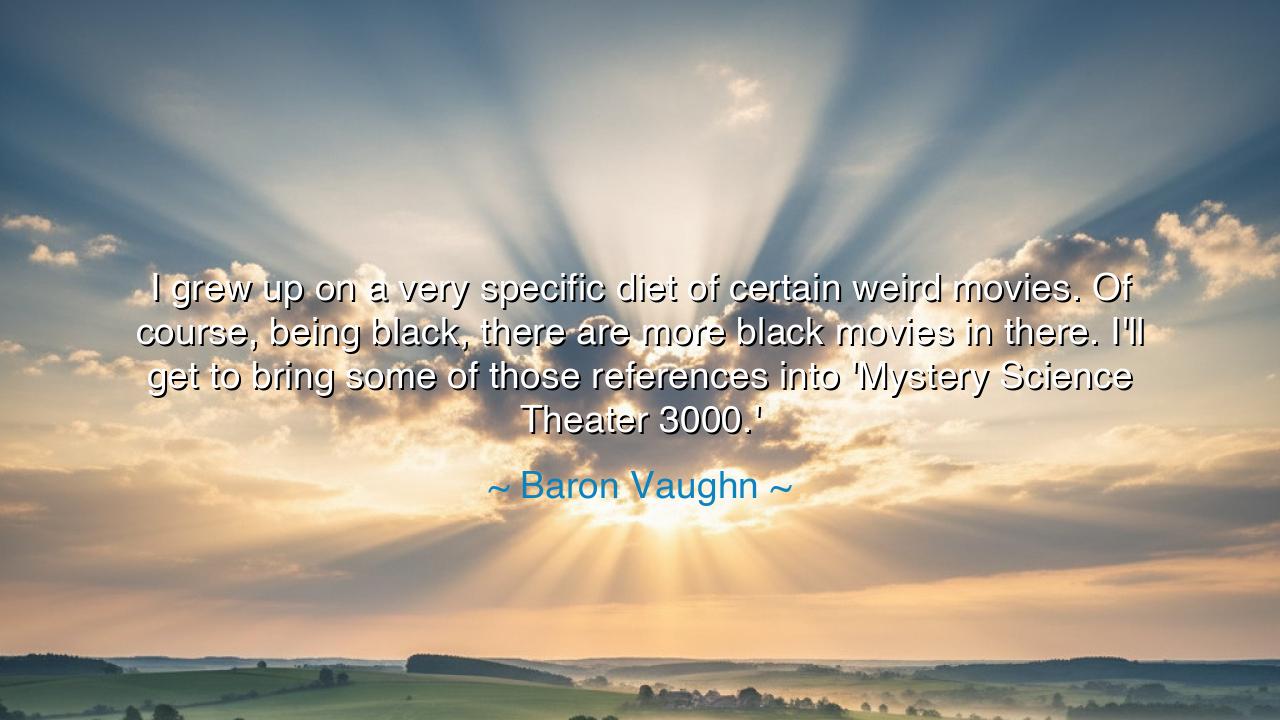
I grew up on a very specific diet of certain weird movies. Of
I grew up on a very specific diet of certain weird movies. Of course, being black, there are more black movies in there. I'll get to bring some of those references into 'Mystery Science Theater 3000.'






When Baron Vaughn said, “I grew up on a very specific diet of certain weird movies. Of course, being Black, there are more Black movies in there. I’ll get to bring some of those references into Mystery Science Theater 3000,” he spoke not only of art and entertainment, but of the formation of identity — of how culture feeds the mind as food feeds the body. His words, though light in tone, carry the weight of a universal truth: that every person is nourished by the stories that shape their imagination, and that what we consume — in art, in experience, in spirit — becomes the foundation of who we are.
The origin of this wisdom lies in the simple yet profound metaphor of a “diet.” To Baron, movies were not merely distractions, but sustenance — fuel for creativity and understanding. His use of the word “weird” is not a rejection of normality, but an embrace of uniqueness, of the strange and the unexpected that awaken the mind. In those films, filled with odd characters, surreal plots, and cultural nuance, he found the seeds of his own artistry. By naming Black films as part of his upbringing, he honors the heritage that nourished his perspective — a reminder that what we watch, read, and love is not random, but ancestral, passed through the invisible chain of influence that links us to those who came before.
The ancients understood this truth well. In every civilization, the stories of a people were their lifeblood — the myths, songs, and plays that carried wisdom from one generation to the next. The Greeks had their tragedies, which taught honor, humility, and hubris. The Africans, across tribes and kingdoms, had their griots — storytellers who kept history alive through rhythm and tale. The Romans had their theater, the Chinese their poetry, the Indians their epic songs of gods and mortals. To feed upon these stories was to be shaped by them. And so, when Vaughn speaks of his “specific diet,” he speaks as those ancients once did — of nourishment through narrative, of identity shaped by the stories we consume.
In the context of his art — his work on Mystery Science Theater 3000 — Vaughn’s words take on an even deeper resonance. The show, long celebrated for its comedic commentary on films both great and terrible, is itself an act of storytelling through reflection. By bringing his own cultural references, his humor, his lens as a Black man raised on a unique set of movies, Vaughn breathes diversity and authenticity into the collective conversation. He stands in a long lineage of artists who transform their past into power, turning personal experience into shared laughter and light. His “diet” becomes his alchemy — the process by which experience becomes expression, and identity becomes art.
History offers many who have done the same. Consider Langston Hughes, who took the rhythms of jazz and the voices of his Harlem community and turned them into poetry that still moves hearts across the world. Or Akira Kurosawa, who grew up on Western films and Japanese epics alike, and forged a cinematic style that united East and West. Like them, Vaughn’s quote reminds us that what we take in from the world — the images, ideas, and traditions — is not meant to be hoarded, but transformed. We are all, in some way, the sum of the stories that have fed us, and the noblest act is to give those stories back to the world, richer and renewed.
There is, too, a subtle wisdom in Vaughn’s balance — in the phrase, “I’ll get to bring some of those references in.” He does not impose, but shares. He understands that art is dialogue, not dominance — that every creator adds flavor to the communal table of culture. Just as his childhood films shaped him, so will his work shape others. This is the cycle of nourishment that sustains civilization: we take in the world, we digest its meaning, and we give it back with our own seasoning of truth.
The lesson, then, is clear and eternal: guard your intellectual and spiritual diet as carefully as your physical one. Choose the art, the stories, the voices that feed your soul — but also honor the strangeness, the difference, the unexpected flavors that expand your vision. Do not fear to bring your heritage, your influences, your “weird movies” into the work you do. They are not burdens — they are your inheritance. For as Baron Vaughn reminds us, what you feed upon becomes what you create. To nourish your mind with diversity, humor, and truth is to prepare yourself to nourish the world in return.
So, children of creativity, remember this: every image you behold, every story you love, is shaping you. Choose wisely, yet with curiosity. Eat from the table of culture, but taste deeply, savor fully, and give back richly. For in the end, the stories that sustain us become the stories we leave behind — and through them, the soul of humanity endures.






AAdministratorAdministrator
Welcome, honored guests. Please leave a comment, we will respond soon